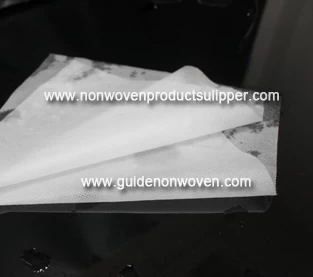are widely used due to their excellent properties, simple processing methods and low prices. In recent years, its applications in medical and health care, clothing, packaging materials, wiping materials, agricultural covering materials, geotextiles and industrial filter materials are more and more widely used, and there is a trend of replacing traditional materials.As pp is a non-polar structure, basically free of hydrophilic groups, PP nonwovens basically no water absorption. Manufacturing hydrophilic pp nonwovens must be hydrophilic modification or hydrophilic finishing.
To improve the hydrophilicity of pp nonwovens, generally by improving the surface wetting properties, there are two main methods of physical modification and chemical modification.Chemical modification of the main changes in the molecular structure of PP in the macromolecular chain to increase hydrophilic groups, thereby changing the hygroscopicity, mainly copolymerization, grafting, crosslinking, chlorination and other methods.Physical modification mainly changes the high-order structure of molecules to achieve the purpose of improving the hydrophilic effect, mainly blending modification and surface modification.We are now mainly using its physical modification to make pp hydrophilic non-woven fabrics.
Second, blending modification (modified before spinning)
According to different additives added time period, can be divided into masterbatch, granulation, spinning before injection.
(1) Ordinary masterbatch method
This is a non-woven manufacturer of hydrophilic non-woven an important method.
The first wood manufacturers will be made of ordinary hydrophilic hydrophilic masterbatch, and then mixed with pp spinning melt spinning into cloth.
Advantages: The production is simple, without adding any equipment, and suitable for small quantities of cattle, while its strong hydrophilic persistence.
Disadvantages: Slow onset of hydrophilic effect, processing performance is not good, often in the spinning can not fabric condition. High cost, the cost is modified surface finishing method 2 to 3 times.
Spinability is poor, need to adjust the process. Some customers use two masterbatch products wasting five tons of cloth did not produce finished products example.
(2) full granulation method
The modifier, pp slices, additives mixed together, granulated by screw full, made of hydrophilic PP particles, and then melt spinning into cloth.
Advantages: good workability, lasting effect, cloth can be used repeatedly.
Disadvantages: the need to increase the screw extruder equipment, tons of higher cost, slow onset of hydrophilic effect, only suitable for mass production.
(3) Spinning injection method
The hydrophilic agent that is hydrophilic-based polymer directly into the main non-woven screw, and PP melt mixing evenly direct spinning.
Advantages: lasting effect, cloth can be used repeatedly.
Disadvantages: because they can not be mixed, often resulting in spinning difficulties, operability is not strong.
Third, surface hydrophilic finishing (after spinning)
Hydrophilic finishing is a method of making hydrophilic non-woven fabric with simple, effective and low cost. Most of our nonwovens manufacturers mainly use this method. The main process is as follows:
Online Spunbond Hot-rolled non-woven fabric - roller coating or water-repellent agent one by one infrared or hot air. One by one coiling machine coiling one by one non-woven fabric hydrophilic finishing
Advantages: There is no spinnability, non-woven hydrophilic fast, efficient, low cost, is the cost of ordinary masterbatch 1 / 2-1 / 3. Suitable for mass production
Disadvantages: the need to purchase separately after-treatment equipment, expensive. Washability is poor, the wash test showed that after 3 times the water permeability increased by about Qiao times. Can not meet the requirements of
multiple use;
To mass production;
The advantages and disadvantages of this method determines its mainly used in the permeable, hydrophilic high disposable products, such as: sanitary materials, diapers, sanitary napkins and so on.

Fourth, the use of composite hydrophilic masterbatch
For (Frist), (Second) the advantages and disadvantages of the method, is now developing a composite hydrophilic masterbatch
The hydrophilic masterbatch plus moderate amount (and ordinary hydrophilic masterbatch), fast onset, the cloth that is effective, as time goes on more effective, with lasting effect, good washability characteristics, but the cost slightly higher (and ordinary hydrophilic masterbatch cost quite).
Spinability is good, no need to adjust the production process.
Suitable for small batch production and wash fastness requirements, repeated use of products, such as forestry and agricultural cloth.
Fifth,
hydrophilic PP non-woven hydrophilic main evaluation indicators are water absorption, contact angle, capillary effect and so on.
(1) Water absorption: refers to the amount of water absorbed by the hydrophilic non-woven fabric per unit mass within the time or in the time required for complete wetting of the material. The larger the water absorption is, the better the effect is.
(2) Contact angle method: The hydrophilic pp non-woven cloth placed on a clean and smooth glass, flat placed in the oven, to melt, to be taken out after melting the glass plate, cooled to room temperature, the direct test method to measure the balance Contact angle. The smaller the contact angle, the better the effect. (Non-hydrophilic PP nonwoven fabric contact angle of about 148 °).
(3) capillary effect: The test method is to be 30cm long, 3cm wide PP hydrophilic cloth sample placed vertically in the capillary effect instrument, the water temperature was controlled at (27 ± 2) ℃, the sample length of water 8 a 10mm, 30min Immediately after taking each sample strip exudate height.
Sixth, Summary
Because pp hydrophilic nonwovens modified its high hydrophilicity, good hygroscopicity and lotion rate, widely used in medical, health, other disposable products and industrial, agricultural and other fields.
Improve the hydrophilic properties of pp non-woven, the pursuit of cheap methods are also more and more attention. At the same time, for different areas and different new uses, new hydrophilic pp non-woven production methods continue to appear, let us work together, but also to the better economic benefits.
